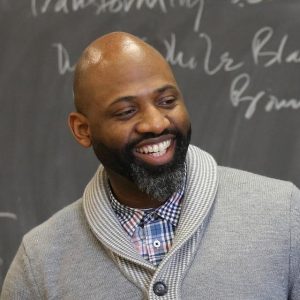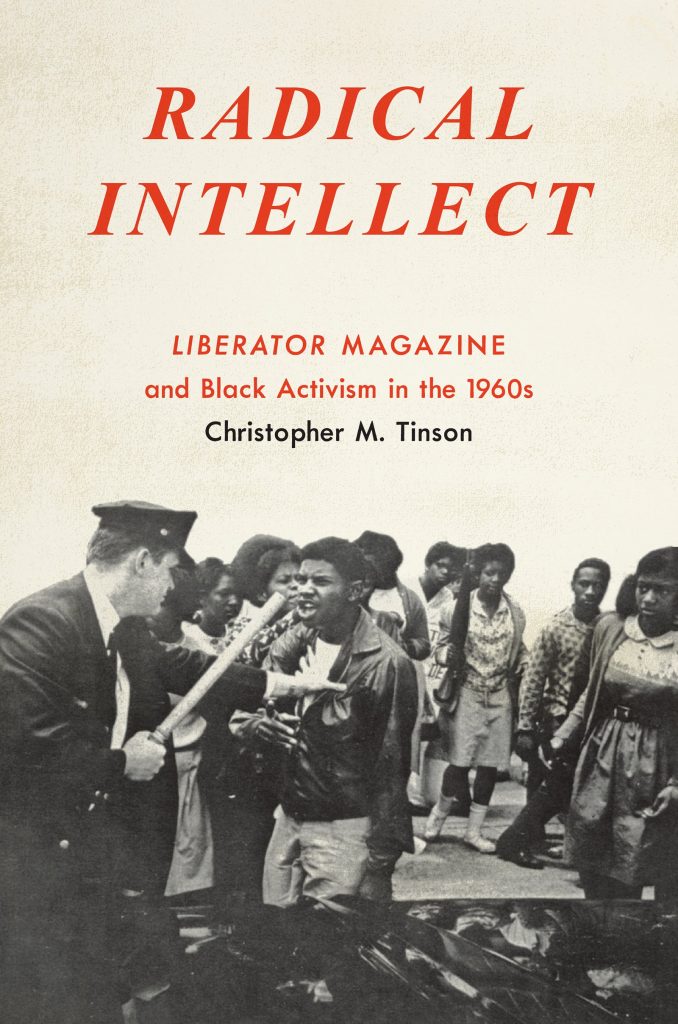Radical Intellect: A New Book on Liberator Magazine
This post is part of our blog series that announces the publication of selected new books in African American History and African Diaspora Studies. Radical Intellect: Liberator Magazine and Black Activism in the 1960s was recently published by The University of North Carolina Press.
***
The author of Radical Intellect is Christopher M. Tinson, an Associate Professor of Africana Studies and History at Hampshire College. His research and teaching is interdisciplinary and focuses on Africana radical traditions, U.S. Ethnic Studies, critical media studies, incarceration, and race and sports. His writings and reviews have been published in the The Black Scholar, The Feminist Wire, Radical Teacher, the Journal of African American History, Equity & Excellence in Education, and Counterpunch. His first book entitled Radical Intellect: Liberator Magazine and Black Activism in the 1960s is published on UNC Press. Professor Tinson is a highly sought-after speaker and mentor who has led professional development workshops and lectured at numerous college campuses, high schools, and carceral institutions throughout New England and the Tri-State area. He is an avid lover of basketball, used bookstores, and good coffee. Follow him on Twitter @Dahktin.
The rise of black radicalism in the 1960s was a result of both the successes and the failures of the civil rights movement. The movement’s victories were inspirational, but its failures to bring about structural political and economic change pushed many to look elsewhere for new strategies. During this era of intellectual ferment, the writers, editors, and activists behind the monthly magazine Liberator (1960–71) were essential contributors to the debate. In the first full-length history of the organization that produced the magazine, Christopher M. Tinson locates the Liberator as a touchstone of U.S.-based black radical thought and organizing in the 1960s. Combining radical journalism with on-the-ground activism, the magazine was dedicated to the dissemination of a range of cultural criticism aimed at spurring political activism, and became the publishing home to many notable radical intellectual-activists of the period, such as Larry Neal, Ossie Davis, Ruby Dee, Harold Cruse, and Askia Touré.
By mapping the history and intellectual trajectory of the Liberator and its thinkers, Tinson traces black intellectual history beyond black power and black nationalism into an internationalism that would shape radical thought for decades to come.
In Radical Intellect, we finally have the riveting story of the Liberator magazine that not only created critical thinking space but also fashioned the crucial platform for ideological conversations in the 1960s black revolt, debating the burning issue of revolution. Now students of black revolt can comprehend the fabric of black radicalism by examining these neglected threads of black liberation, black arts renaissance, and anti-colonialism. Christopher Tinson joins the young lions in forging the new paradigm of black freedom studies: Bravo!”–Komozi Woodard, author of A Nation within a Nation
Ibram X. Kendi: What are the principal findings or arguments of your book? What do you hope readers take away from reading it?
Christopher M. Tinson: As a New York City based publication with the global struggle against racism and colonialism in its purview, Liberator magazine (1960-1971) emerged as a critical training ground for a range of radical thinkers and artists, including a number of visual artists, jazz musicians and critics, playwrights, and poets. These individuals shared a commitment to black political possibility, which included demands for increased political visibility, the creation of and control over educational, cultural and political institutions, as well as the reimagining and seizing of power.
As a critical locus of black radical thought and expression, the periodical drew upon the militant and radical outlooks of men and women activists who utilized the pages of the periodical to test their own evolving ideas and ideological commitments, express political dissent, or share their revolutionary visions. While all of these individuals would vocalize their vision for a liberated future on the Liberator’s pages, many would continue to shape the political and cultural contours of African American activism well after the periodical’s end. Radical Intellect offers a look into the social and political forces that brought this group together, highlights their wide ranging contributions to the radical political perspectives in the period, and locates the periodical as an important locus of Black nationalist, revolutionary nationalist, left anti-racist, and anti-colonialist protest thought to reveal the Liberator’s anticipation of the full expression of Black Power, which emerged in the middle of the decade.
Radical Intellect thus sets out to broaden understanding of the wide-ranging histories and politics of radicalism and black militancy by bringing to the forefront a variety of radical thinkers, activists, and organizations that collectively imagined fundamental, radical social transformation.
I hope that my readers will appreciate my deep dive into the Liberator’s history and gain a broader understanding of the role of African liberation struggles and consciousness of international struggle in shaping its content and perspective. Readers should also get a firm sense of the multiple locations of black radical thought, and the points of contestation therein, while gaining an awareness and appreciation of the voices of lesser-known figures alongside the contributions of prominent activists and artists. Readers will achieve a broader understanding of grassroots organizing that led up to Black Power and Black Arts activities, and the social, political, and cultural impulses that drove that activity.
Copyright © AAIHS. May not be reprinted without permission.

